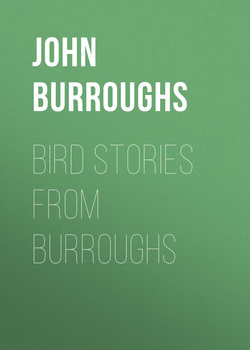Читать книгу Bird Stories from Burroughs - John Burroughs - Страница 5
THE PHŒBE
ОглавлениеAnother April bird whose memory I fondly cherish is the phœbe-bird, the pioneer of the flycatchers. In the inland farming districts, I used to notice him, on some bright morning about Easter Day, proclaiming his arrival, with much variety of motion and attitude, from the peak of the barn or hay-shed. As yet, you may have heard only the plaintive, homesick note of the bluebird, or the faint trill of the song sparrow; and the phœbe's clear, vivacious assurance of his veritable bodily presence among us again is welcomed by all ears. At agreeable intervals in his lay he describes a circle or an ellipse in the air, ostensibly prospecting for insects, but really, I suspect, as an artistic flourish, thrown in to make up in some way for the deficiency of his musical performance. If plainness of dress indicates powers of song, as it usually does, the phœbe ought to be unrivaled in musical ability, for surely that ashen-gray suit is the superlative of plainness; and that form, likewise, would hardly pass for a "perfect figure" of a bird. The seasonableness of his coming, however, and his civil, neighborly ways, shall make up for all deficiencies in song and plumage.
The phœbe-bird is a wise architect and perhaps enjoys as great an immunity from danger, both in its person and its nest, as any other bird. Its modest ashen-gray suit is the color of the rocks where it builds, and the moss of which it makes such free use gives to its nest the look of a natural growth or accretion. But when it comes into the barn or under the shed to build, as it so frequently does, the moss is rather out of place. Doubtless in time the bird will take the hint, and when she builds in such places will leave the moss out. I noted but two nests the summer I am speaking of: one in a barn failed of issue, on account of the rats, I suspect, though the little owl may have been the depredator; the other, in the woods, sent forth three young. This latter nest was most charmingly and ingeniously placed. I discovered it while in quest of pond-lilies, in a long, deep, level stretch of water in the woods. A large tree had blown over at the edge of the water, and its dense mass of upturned roots, with the black, peaty soil filling the interstices, was like the fragment of a wall several feet high, rising from the edge of the languid current. In a niche in this earthy wall, and visible and accessible only from the water, a phœbe had built her nest and reared her brood. I paddled my boat up and came alongside prepared to take the family aboard. The young, nearly ready to fly, were quite undisturbed by my presence, having probably been assured that no danger need be apprehended from that side. It was not a likely place for minks, or they would not have been so secure.
THE COMING OF PHŒBE
When buckets shine 'gainst maple trees
And drop by drop the sap doth flow,
When days are warm, but still nights freeze,
And deep in woods lie drifts of snow,
When cattle low and fret in stall,
Then morning brings the phœbe's call,
"Phœbe,
Phœbe, phœbe," a cheery note,
While cackling hens make such a rout.
When snowbanks run, and hills are bare,
And early bees hum round the hive,
When woodchucks creep from out their lair
Right glad to find themselves alive,
When sheep go nibbling through the fields,
Then Phœbe oft her name reveals,
"Phœbe,
Phœbe, phœbe," a plaintive cry,
While jack-snipes call in morning sky.
When wild ducks quack in creek and pond
And bluebirds perch on mullein-stalks,
When spring has burst her icy bond
And in brown fields the sleek crow walks,
When chipmunks court in roadside walls,
Then Phœbe from the ridgeboard calls,
"Phœbe,
Phœbe, phœbe," and lifts her cap,
While smoking Dick doth boil the sap.
